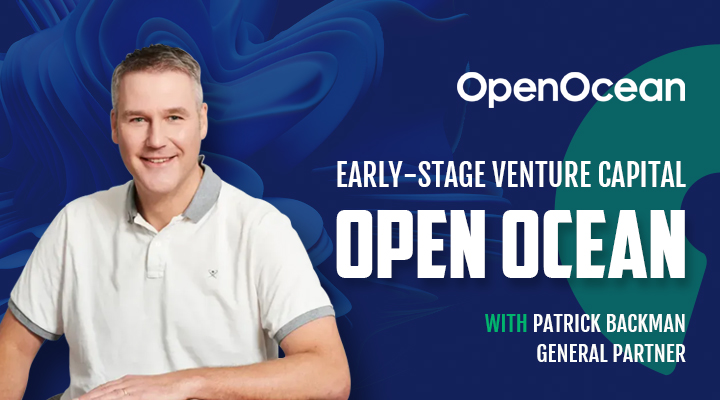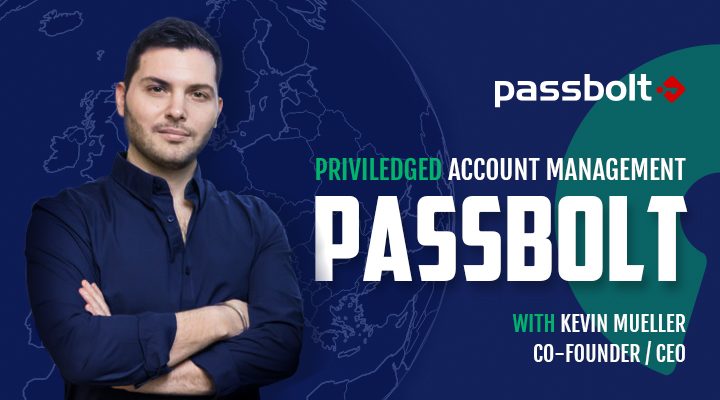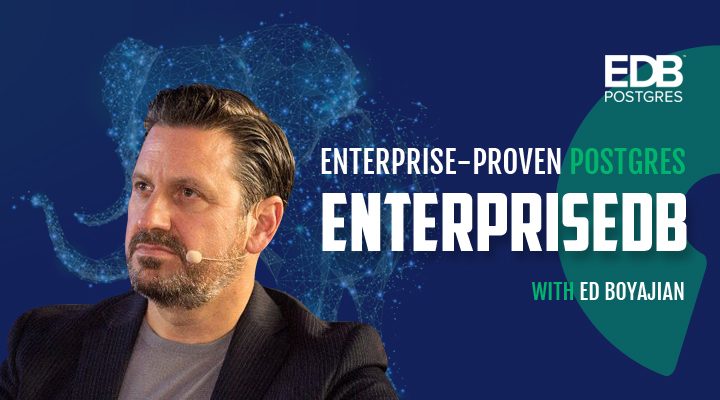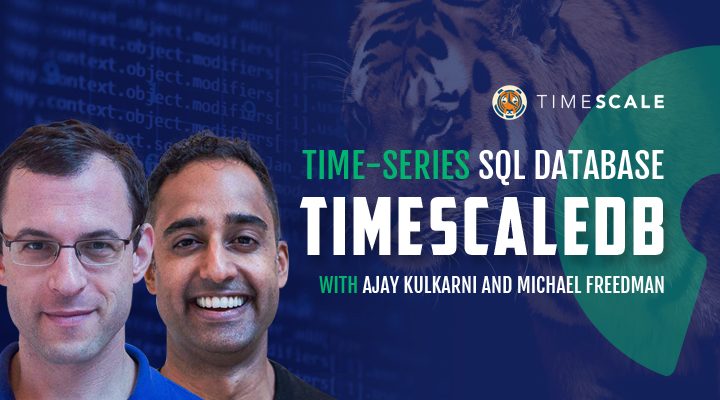
Episode 70: Early-Stage Venture Capital, OpenOcean, with Patrik Backman
Podcast: Play in new window | Download
Subscribe: RSS
Intro
Mike: Hello and welcome to Open Source Underdogs! I’m your host Mike Schwartz, founder of Gluu, and this is episode 70 with Patrick Backman, General Partner, CEO and Co-Founder at OpenOcean, and Co-Founder of MariaDB.
This episode uncharacteristically diverges from the normal format. It’s more of a general interview than a discussion on the business model of a specific company. We recorded it a few weeks back on March 1st. The release was delayed because I wanted to prioritize Kevin Muller’s pitch for attending the Open Source Founder Summit in Paris this coming May.
And if you’re on the fence about the Founder Summit, there’s still time. Last night, I had some barbecue with Frank Karlitschek, founder of NextCloud, and he told me that NextCloud did 80% growth on a revenue base in excess of $10M. So, if you want to find out how we did that, and you have the resources, go hang out with him and lots of other talented founders in Paris at the Open Source Founder Summit.
And, as this is a bit of an unconventional episode, maybe now is a good time to set some expectations for The Underdogs podcast for the next couple of years. My plan is to complete around six episodes per year for the next five years and finish at around 100 episodes.
The 100th episode will be Gluu, and you’ll find out how I was able to put all these years of feedback to work in my own startup.
I’ll be recording in person at FOSDEM, SO-CON and All Things Open. If you feel like your startup should be on the Underdogs podcast, or you have a suggestion for a startup that I should reach out to, send me a message on LinkedIn. I’m always on the lookout.
The other reason I’m slowing down is that Emily Omier’s podcast The Business of Open Source is doing a great job, documenting firsthand accounts from business leaders in the open-source world.
If Emily’s podcast existed in 2018, I might not have even started Underdogs. So, if you haven’t listened to her podcast, you should add it to your queue. And thanks Emily for all the hard work, a lot of logistics preparation and post-production work goes into each episode, so 200 episodes doesn’t just happen without a lot of commitment.
With that lengthy intro behind us, let’s finally get back to the interview with Patrik Backman. He’s a bit of walking internet history. And it was a lot of fun to get an opportunity to chat with him, so here we go. Patrik, thank you so much for joining us today.
Career Overview
Patrik: Yeah, it’s a pleasure, thank you.
Mike: Maybe just for the audience you could tell us a little bit about your background, and how you ended up entering the database business.
Patrik: I started actually out of school, out of university, I got recruited into MySQL, or MySequeL, as they say in the US, in 2003, and then I worked six years as part of MySQL database company. From couple of million in revenue, or almost 100, from 50 people to about 600, and then, in the last couple of years, I was part of the management team, I run a large part of product development, and also some business development.
And then, following the MySQL time, we exited to Sun Microsystems in 2008 for $1 billion – that was a great achievement, at least in the European, so to say, start of ecosystem. Following that, we started exploring how to build a venture-capital business. And parallel with that, we co-founded a company called MariaDB, which is a successor company to MySQL. But since 2011, I’ve been operating as a general partner, together with two other partners with OpenOcean, which does kind of invest in the early-stage data software in Europe.
Years at Sun
Mike: I have a Sun Microsystems’ coffee cup. I’m just curious, as somebody who had actually worked at Sun for a while, if you could talk a little bit about what was Sun like?
Patrik: It was quite a remarkable journey. After being acquired by Sun, I was part of the Sun for almost a year, and also part of the integration kind of tasks force to integrate the MySQL company into Sun Microsystems. But I think there was extraordinary talent around engineering overall in the business – it was of course a huge company – 35,000 people – but extraordinary talent, especially a software team which I met a lot, however, the commercial side was quite awkward to me. At the time, much of the philosophy seemed to be — what I noticed was that software was open-source, and for free. And then, the point was to sell hardware.
So, me coming in, with MySQL and still thinking that, ‘hey, it’s an interesting scaling business, there’s a lot of good ways to make business around open source’, Sun didn’t really have that mentality. And we were quite a lot discussing their how could kind of the commercial side be developed around the open-source products that Sun had and many, many great ones.
But then, I think the business side of that was a bit lacking, and they never really got to build that out – the company almost went into insolvency, or big difficulties, and then Oracle acquired it at a quite low price.
Inevitability of Oracle Owning MySQL
Mike: Do you think it’s somewhat ironic that Oracle, the prototypical commercial database company, ends up owning MySQL in the end?
Patrik: Well, what I’ve heard, and this is just ,of course, a rumor – so, “maybe” what people suspect – but I heard rumors that Larry Ellison always kind of wanted MySQL, to have control of it, because it was so popular and it had such a huge impact in the database industry, in terms of popularity, and in terms of power in the web and internet overall.
So, I think there was even some rumors that Oracle even earlier tried to get their hands on it, so to say, one way or the other, especially Sun Microsystems acquisition. Supposedly, it was much tied to the fact that that way they got control over MySQL.
More restrictive licenses resulting from Foss strip mining
Mike: I want to Pivot to MariaDB. I spoke with Michael Howard in 2018, and he was promoting BSL, or Business Source License, which HashiCorp later adopted also after a billion downloads of Terraform. Do you think that companies moving to these new restrictive licenses is a signal that the industry is standing up for itself, and that it’s sort of growing tired of the exploitive use of its software?
Patrik: Yes, absolutely. I think it’s a clear signal. At MySQL, 15 years ago, there was this — maybe today it seems naive thinking that ‘hey, if AWS, for instance, and Google, and Facebook use a lot of MySQL, somehow it will drive a commercial relationship down the line’, which is kind of beneficial to both parties and grateful for everyone.
However, it never really got there. It turned out that nowadays AWS has millions of these installations for their customers, and making a lot of money on them, but still paying really nothing for it. So, it has been clear that big players out there, they really want to use open source as far as they can for free, but themselves making a lot of money on it.
As this has become very evident that money will easily come to this popular open-source platform, then the restrictive license is what you need to go for, so to say. You need to be smart about your licenses so that it drives things to your business needs. Then, a question comes up, of course, for founders out there: what is the business need and the business ambition that the founder has, and different licenses serve different business models.
What is the best open-source license?
Mike: So, let’s say I invent a new database called PigeonDB, and I want to license it somehow. Well, MariaDB used BSL licensing. Did that work? Like, what license should I use?
Patrik: As a founder, if you want to build a small kind of services business, you can use a free license as you want, very permissive. In that way, it gets maximum popularity, and spread, and awareness and adoption. Then, you can sell some support, or some fixes, or some advisory, or consultancy to users out there. And that’s a good business. You can even hire a few people, maybe tens of people, making even a few millions a year, and that’s a nice lifestyle business. That is a perfectly safe and good choice to make.
However, if you want to do more of a product-oriented business and earn licenses, or earn kind of product revenue for your product, then you need to have some restrictions on that distribution that you have. And I think that MongoDB is a perfect example of that. In popularity, I think MySQL and even MariaDB might be even more popular than Mongo. However, Mongo is making much more money than MySQL or MariaDB for that matter. So, having a restrictive license that prevents, so to say, kind of AGPL preventing the big player from just kind of hosting their own service database services and taking all the money for it.
Do we need a new open-source movement?
Mike: Bruce Perens at State of Open mentioned the idea that maybe we need a new category of licenses. Do you have any idea if we did, what that would look like?
Patrik: I don’t know directly. I think there’s a good variety of licenses, and of course, one could always write their own, so to say, business source license is a new one created at MySQL and used at MariaDB. What open-source movement kind of have tried to do, or have done for 30 years, is collaborative work around software – it’s mostly the licenses have focused on one downloadable kind of software package that you take and install, and use kind of standalone, or in a combination with other software.
Now, most companies around open source, and also elsewhere, are making money by providing a service online. So, it’s a software service online, a cloud service. And somehow, it’s interesting that, in my mind, there’s a lot of enterprises combining open-source software, using it in their cloud setting for their own needs, but this glue – how they put things together, how they manage it, and so forth – this glue is typically proprietary.
Either they make it themselves, buy some proprietary by someone else, or buy this glue, so to say, from others, and somehow, an openness on this kind of glue between software and how it’s used in a cloud setting, maybe there could be some open-source movement on that. But that probably requires a whole new way of thinking. This is just an early thought, but something I’ve been pondering about.
Is Open Source a Tragedy of the Commons?
Mike: We have a professor here at UT Austin, who’s compared open-source software to a tragedy of the commons. Typically, in a tragedy of the commons, there’s a “freeloader problem”, where the freeloader is causing the degradation of the resource. I kind of argue that, well, what if the resource here isn’t just the software – because there’s no incremental cost to copying the software – but what if the incremental cost is actually maintenance of the project. Because for infrastructure projects like databases, what people really want is a stream of updates to the dependencies.
So, I’m wondering if you could sort of comment on the idea of like, is this “tragedy of the commons” analogy useful, and how do we avoid freeloaders?
Patrik: I mean, it’s built into the model that is open source. If you provide it with a permissive license, then people can use it for free and take benefit, and even maybe in a business way, in a wrong way so to say, take benefit of it, and so forth. But I think what should be recognized, and understood, and respected is that, indeed, anyone building software, even providing a free and open-source software, they should be allowed to have a credible and sustainable business model in order for them to be able to maintain and further develop it. But, then, it’s about what kind of balance you want to strike with what is free and what is commercial, and that’s where the license comes in.
Can the Government Help Fund Open Source Infrastructure?
Mike: There’s over four million open-source projects now. If you add up all the packages, and the repos, and especially the MPM repositories – excluding GitHub, who knows what it is if you include GitHub – there’s so much diversity in open-source projects. It seems like what you’re really saying is not that open source in general should have a business model, but certain types of infrastructure.
The government, let’s say, was going to fund open-source infrastructure to sort of address this freeloader problem – how would they know which ones to invest in?
Patrik: I don’t really know if that can be steered by government, or by any kind of regulating body, or any smart individual in that sense. I believe in the free market that there’s a lot of people can develop, and release, and provide software under different licenses and commercial models, and that it can be free or commercial, or closed-source or open-source. But in the end, it’s up to anyone in need of a certain solution then to decide what they take and on what premises.
I mean, someone might be okay to take something free and be ready to maintain it themselves, and not care about it if there’s a commercial side to it, or a company behind it, or even a developer behind it. Or vice-versa: someone wants to pay something for strong assurance that it’s managed by a company, and resources, and everything.
Beware VC Advice
Mike: I always caution founders that the advice you will get from venture capitalists is the advice of how do you make this into a really high-growth business.
Patrik: Yes. I could also give advice on how to just get maximum spread in different ways. However, what we, of course, think about as venture capitalists is that we try to find those businesses and help those businesses, or founders, that really want to build something significant in terms of a business and not just in terms of following.
Community Lead Growth?
Mike: What I’ve noticed is a trend towards something called community-led growth, where the company raises a bunch of venture capital. And then, they start an open-source project, and try and find a really devoted group of super fans who love what they’re doing, and then they look for a monetization strategy out of that. Have you been seeing that model more, and do you have any thoughts about is that going to lead to high- growth companies, or is it just a risky investment?
Patrik: Well, it is risky, it can work, but it’s often hard. I think specifically what is hard is that those founders, who are able and skillful enough to create a super-quality software that spreads and becomes open-source kind of very, very popular, the way to make money is often: yes, you can do an open-core model and have some commercial features, so to say.
And there’s a few examples of who have succeeded. I mean, Gitlab, and so forth, have succeeded in building kind of more than 100 million in revenue, but no one has really done with open-core kind of billions in revenue. And today, the way to really make money is by providing a cloud service – that’s what Mongo is doing very successfully, and many others.
And to build the challenge for those founders who create a very popular software distribution, kind of open-source software distribution, the mentality, and mindset, and skill set for building a cloud service is very, very different from building a great piece of software that you provide for downloading open source. So, often, the challenge is, and the risk is, how do you bring in that skill if you want to build a very large business.
Should Governments Use Open Source?
Mike: Patrik, you’re in Helsinki in Europe, and there’s a lot of innovation towards let’s say driving digital public infrastructure in the government. Should the government use open-source software, and how should the government consume and procure open-source software?
Patrik: That’s a good question. I think that open source really matters in infrastructure – to go back to the Oracle example, I think what enterprises, but also governments, should think about when it comes to infrastructure, you don’t really want to rely on something, like, a core piece of your infrastructure, where the provider can come every year and ask for 20% more in pricing, and you have no way to circumvent that.
So, a critical piece of infrastructure is, you shouldn’t have a lock-in closed-source component and the company that can squeeze you behind it. So, for infrastructure, it really matters, and then, how they should procure it – there’s always this software kind of service providers consultancy houses that still are needed to kind of sell it, in this way or another.
Yes, maybe the pieces can be free, but someone needs to help glue it all together, and help serve it, and help support it, and so forth. I think the biggest problem really is not in the nitty-gritty details of how government should buy these things, but actually in having a smart, technical person who is skilled in this kind of software, who knows what they’re doing.
Most things that could go wrong in my mind, when government buys software, be it open-source or closed, is that there’s incredible stupidity in the world – they try to, without really understanding the software, they try to do a long list of requirements. And then, the big software house, with maybe 20-year-old software, is the only one who has the resources to really answer all those zillion questions and come up with a packaging that serves all those needs. And then, it costs a billion to implement. It’s just crazy that these things happen with public money.
How to get the word out that open source isn’t free
Mike: I bet you’re talking about Western governments too, having challenges in operation of IT. How do we help all these other governments who want to implement, and we’re telling them to use open-source, but how do we communicate to them that we also need updates of the software, we need maintenance, and we need innovation in order for them to really make these ecosystems work?
Patrik: I must say I don’t know how to inform them, but this notion of “things should just be free”, yes, it certainly exists out there, and most companies want everything to be free, and the government. However, inside IT people understand that nothing is free – you need maintenance, you need support, you need help, you need people around any software to operate, and run it, and of course, improve it, but how to inform and educate people, it’s a good question that I don’t know how to answer.
Is now a good time to start a software company?
Mike: Last question, is now a good time to launch a software startup?
Patrik: Well, absolutely. It’s just tremendous what opportunities are out there. I think we have only scratched the surface of what data software can do, for instance, in all enterprises, in all businesses, in all functions, and probably in society, there’s processes and functions that can be digitalized, automated, optimized and improved. We’ve only seen the beginning of that. And of course, with hyper on AI, it’s a much broader thing than that.
It’s like everywhere in business, in functioning governments, in society, you can start tracking data, gathering data cheaper than ever before, put it together, build algorithms around it very easily to get intelligence out of it, get predictions out of it, get things optimized and automated – I think it’s very fascinating how the world can be improved in so many ways, using software in the future, and in the near-term actually. I think it’s a great time right now to think about wild ambitious ideas and work to implement them.
Close
Mike: Patrik, thank you so much for joining and sharing all that experience with us.
Patrik: Thank you so much. It was really a pleasure.
Mike: And thanks to Alexander Izza from Resonance Public Relations. Cool graphics from Kamal Bhattacharjee. Music from Brooke For Free, Chris Zabriskie and Lee Rosevere. Next episodes will be recorded at the All Things Open Conference in downtown Raleigh, October 27th – 29th, 2024. This is one of the best open-source conferences in the US, so please join us if you can.
Until next time, thanks for joining.




